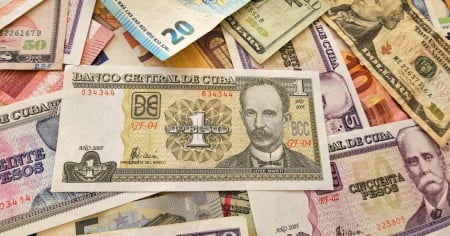In the Havana municipality of Playa, specifically near the well-known supermarket at 3rd and 70, a commercial space has been inaugurated that has generated divided opinions: Marealta Boulevard.
The influencer Calis, from the YouTube channel Calislandia, documented her experience visiting this shopping center, where customers can find sandals, heels, stylish clothing, shoes from the brands Piccadilly and Lolis, as well as expensive bags and suitcases for most Cubans.
These stores offer exclusive products from international brands such as Reebok, Adidas, Giorgio, and perfumes like Mugler's Angel, among others. Payments are made in foreign currency using international and national cards in MLC.
During her visit, the content creator was warned that recording inside the stores was not allowed, which piqued the interest and curiosity of her followers.
In the comments of your video, one person highlighted: "I don't believe that Marealta Boulevard is for the wealthy. The fact that the average Cuban is impoverished doesn't mean that this is a store for rich people."
These types of opinions reinforce the debate about the social impact of these businesses in a country where income in Cuban pesos is insufficient for most workers and retirees.
Among the options available at the select store, a perfumery stands out, showcasing fragrances from renowned international brands. Additionally, the future opening of a store dedicated to Giorgio was announced, further solidifying the offering of high-end products.
These stores stand in stark contrast to the economic reality faced by the average Cuban, highlighting the growing inequality in access to consumer goods.
Dollarization in Cuba and the "luxury stores"
The opening of exclusive establishments such as Marealta Boulevard in Havana falls within a trend that has generated controversy in Cuba for years.
This phenomenon, which includes stores aimed at economic elites, has been fueled by dollarization policies and the opening of the market to luxury goods since at least 2017, when spaces like the one located in the Hotel Manzana de Gómez debuted.
Recently, the opening of the dollar supermarket at 3ra y 70 in Havana marked another critical point in this dynamic, highlighting a growing economic segmentation. The establishment, like Marealta Boulevard, has been described as inaccessible to the majority of Cubans.
The regulations on foreign currency implemented in December 2024 established a framework that amplifies social inequality. These measures, combined with the dollarization of key sectors, enable the proliferation of businesses aimed at the wealthy in Cuba, leaving a large part of the population at a disadvantage.
Marealta Boulevard symbolizes this contrast. It is a place that showcases opulence and high-end products amidst an economic reality marked by limitations and widespread scarcity.
Frequently Asked Questions about the New Dollar Stores in Havana
What is Marealta Boulevard and why has it generated controversy in Cuba?
Marealta Boulevard is a commercial space in Havana that offers products from international luxury brands, such as Adidas and Giorgio, accessible only to those who can pay in international currencies or MLC. Its opening has sparked controversy due to the economic exclusion it represents for the majority of Cubans, who cannot access these products as they receive their salaries in devalued Cuban pesos.
Why do the new stores in Havana only accept dollars or MLC?
The Cuban government has implemented a policy of partial dollarization to attract foreign currency amid an economic crisis. These stores, such as Marealta Boulevard and the supermarket on 3rd and 70th, only accept dollars or MLC, excluding those who do not have access to these currencies, which increases inequality in the country.
How does the dollarization of stores affect the Cuban economy?
The dollarization of stores in Cuba exacerbates economic inequalities by creating a parallel market where only those with access to foreign currency can purchase consumer goods. This leaves the majority of the population, who receive their salaries in Cuban pesos, at a disadvantage and increases reliance on remittances from abroad.
What has been the reaction of the Cuban population to the new dollar stores?
The opening of stores that only accept dollars has caused outrage and discomfort among the Cuban population. Many criticize that these stores are inaccessible to the majority, who do not earn in foreign currency, and point out that the government's measures only widen the social and economic gap in the country.
Filed under:
